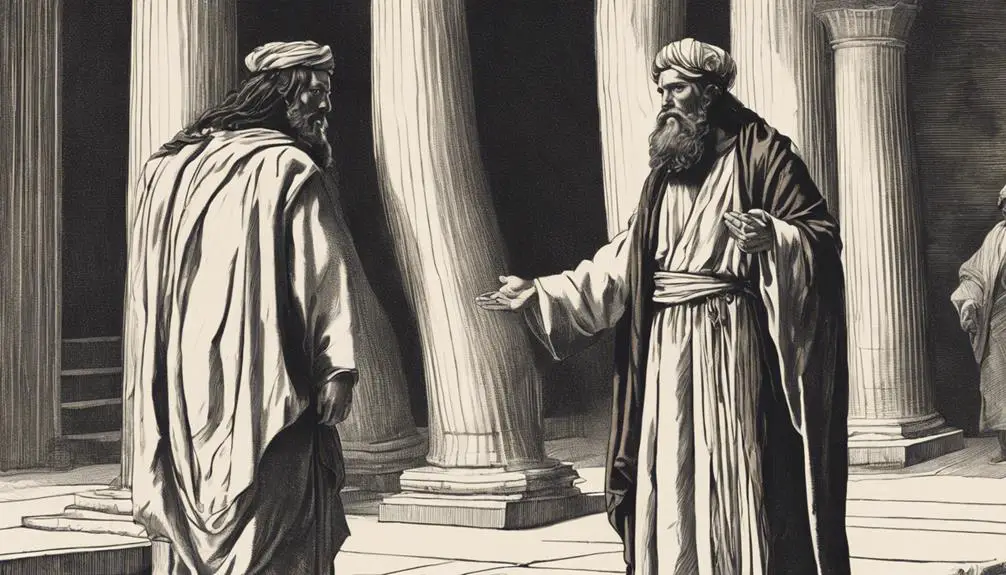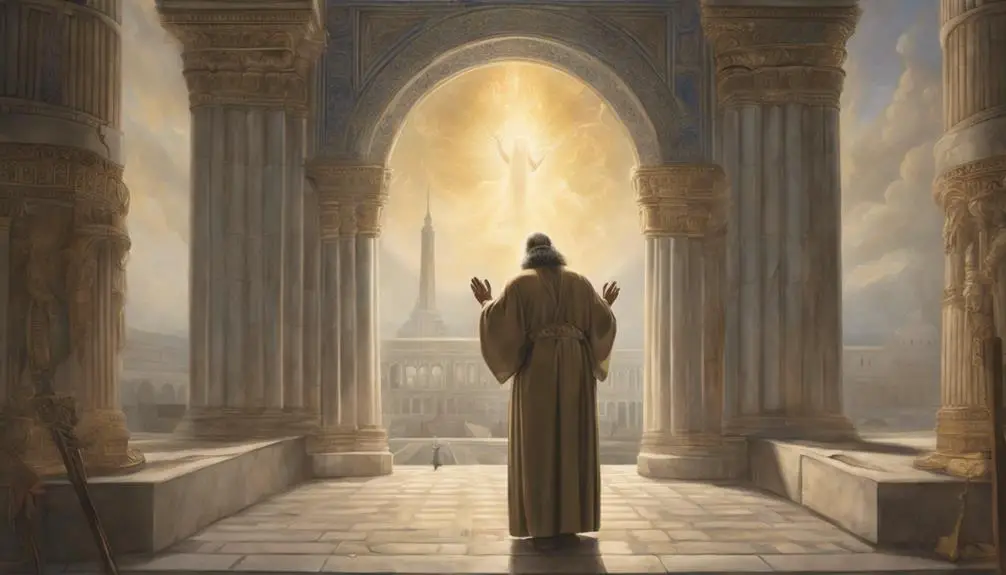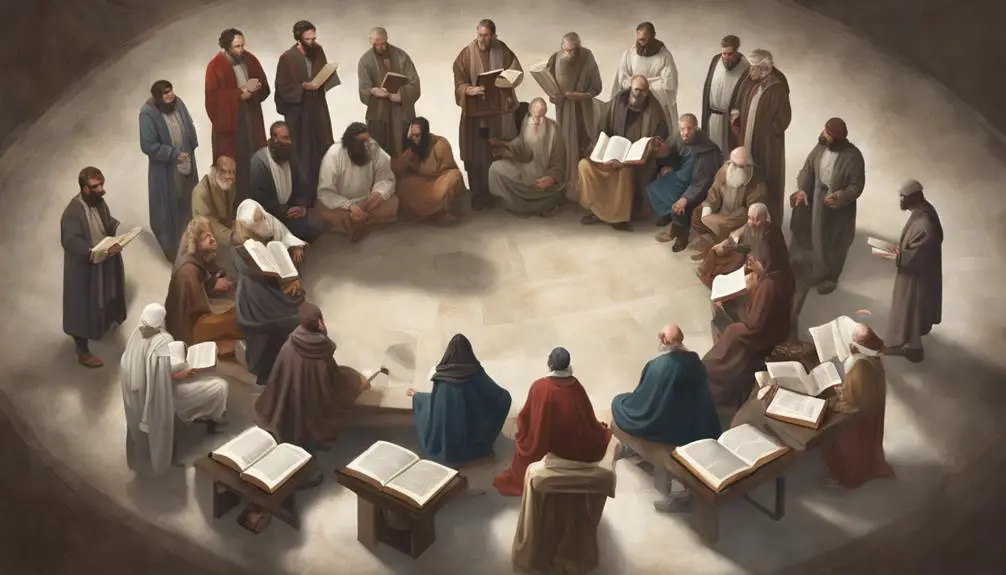Crack open Luke 18:9-14 and dive into deep questions that challenge your understanding of the Pharisee and the Tax Collector's parable.

Luke 18 9 14 Bible Study Questions
So, you think you've got the Parable of the Pharisee and the Tax Collector all figured out, do you? Well, let's put that confidence to the test.
This parable, found in Luke 18:9-14, is a compelling narrative filled with religious tension and deep spiritual insights. As we dissect this passage, you'll have the chance to explore the stark differences between the self-righteous Pharisee and the humble tax collector.
But be prepared, you might find that this parable challenges your perceptions in ways you didn't expect. Are you ready to take this journey into the heart of scripture?
Key Takeaways
- The Pharisee's self-righteous prayer offers a cautionary example against spiritual arrogance, highlighting the importance of genuine humility before God.
- The tax collector's humble approach, acknowledging his moral shortcomings and seeking God's mercy, serves as a model for contrite prayer.
- The parable underlines the significance of self-awareness and repentance, emphasizing the need for a humble and contrite heart in modern life.
- This text encourages self-reflection on personal attitudes and actions, calling for the embodiment of Christ-like virtues in the face of contemporary challenges.
Understanding the Parable's Context

To fully grasp the profound message of Luke 18:9-14, let's first delve into the context in which this parable was shared. This passage is part of a larger narrative, where Jesus teaches about prayer, humility, and justification. He was addressing those who were confident in their own righteousness and looked down on others, primarily the Pharisees. It's important to note that the Pharisees were a religious sect known for their strict observance of religious laws and rituals, often to the point of pride and hypocrisy.
Jesus shared this parable during His journey to Jerusalem, where He was to be crucified. This journey is significant as it symbolizes Jesus' mission to save humanity from sin. Understanding this broader context helps you appreciate the depth of the parable's message, and its relevance to Jesus' mission.
Moreover, this parable was shared in the Second Temple period, a time when the Jewish community was grappling with foreign influences, social inequality, and religious identity. This context influenced how the parable's audience interpreted its message, and it's instrumental in our understanding of the passage today.
Key Characters in Luke 18:9-14

Having explored the broader context of this parable, let's now examine the key characters in Luke 18:9-14, as they play critical roles that offer us profound insights into the essence of prayer, humility, and justification.
The first character, the Pharisee, is a respected religious leader of his time. His self-righteous attitude and prayer, however, reveal a lack of humility and a misunderstanding of God's grace. He relies on his own righteousness, rather than on God's mercy, for justification. This character serves as a cautionary figure, illuminating the pitfalls of spiritual pride and self-sufficiency.
On the other hand, the tax collector stands as a stark contrast to the Pharisee. Despite his societal status as a 'sinner,' his humble plea for mercy demonstrates an understanding of his need for divine grace. His humility, repentance, and reliance on God's mercy result in his justification, as stated by Jesus in verse 14.
These two characters, with their markedly different attitudes towards prayer and justification, present a vivid illustration of Jesus' teaching on humility and grace. They also challenge us to examine our own attitudes and understandings in light of this teaching.
Unpacking the Pharisee's Prayer

Delving into the Pharisee's prayer, you'll notice his self-righteousness is prominently displayed, reflecting a deep-seated sense of spiritual superiority and a lack of reliance on God's mercy. His prayer, 'God, I thank you that I'm not like other men,' unveils his pride and contempt for others. This prayer is troubling, not because of its thankfulness, but due to its self-centeredness; it's more fixated with his own righteousness than acknowledging God's grace.
Scrutinizing further, you'll observe how the Pharisee enumerates his 'righteous acts,' such as fasting twice a week and tithing all he gets. Here, his prayer becomes a recitation of his virtuous deeds, missing the mark of genuine prayer which is communication with God, not a monologue of self-praise. He places himself at the center, pushing God to the periphery.
In essence, the Pharisee's prayer is a manifestation of his self-sufficiency and spiritual arrogance, which estranges him from the mercy of God. His prayer contradicts the fundamental essence of prayer in Christianity: humble communication, reliance on God's mercy, and recognition of our own sinfulness. This case study serves as a cautionary tale, reminding us not to fall into the trap of self-righteousness in our spiritual journey.
Analyzing the Tax Collector's Humility

In stark contrast to the self-righteous Pharisee, the humility of the tax collector offers a powerful lesson in authentic spirituality. This character, despised by society and aware of his moral shortcomings, doesn't stand proudly but stays at a distance, unwilling to even lift his gaze towards heaven. His prayer, 'God, have mercy on me, a sinner,' is a succinct confession of his unworthiness and dependence on God's mercy.
Analyzing his humility, you'll notice its two critical aspects. Firstly, it's rooted in self-awareness. He recognizes his sinfulness, a stark divergence from the Pharisee's self-glorification. Secondly, his humility leads to repentance, not despair. He isn't paralyzed by his sin but turns to God in contrition.
His humility also affects his posture. His actions—standing far off, not daring to lift his eyes to heaven, beating his breast—demonstrate his inner humility externally. This humility isn't for show, unlike the Pharisee's prayer. It's a genuine outward expression of his internal state.
Applying the Parable to Modern Life

How can we apply the lessons from this parable to our modern lives? The parable's core message is humility and the need for a contrite heart before God. In our modern society, where self-promotion and boasting are often celebrated, this biblical lesson calls for a stark contrast.
The Pharisee represents those who rely on their righteousness and look down on others. On the other hand, the tax collector epitomizes those aware of their unworthiness and seek God's mercy. Here's a table to illustrate how these characters' attitudes can manifest in today's world:
Pharisee's Attitude |
Tax Collector's Attitude |
Modern Application |
|---|---|---|
Self-righteousness |
Humility |
Don't be complacent in achievements; acknowledge God's grace |
Contempt for others |
Recognition of sin |
Refrain from judging others; we all fall short |
Public display of piety |
Private, sincere repentance |
Genuine faith isn't for show; cultivate a personal relationship with God |
The parable reminds you to examine your attitudes and actions. It's a call to humility, recognizing our imperfections, and seeking God's mercy. It discourages spiritual complacency and urges genuine, personal faith. Such application is integral to living a Christ-like life amidst modern challenges.
Conclusion
In analyzing Luke 18:9-14, we've examined the context, characters, and contrasting prayers. We've seen the Pharisee's self-righteousness and the tax collector's humility.
Applying this parable to today, it's clear that true righteousness isn't about outward appearances, but inner humility and repentance. This study underscores the importance of self-reflection and humility in our spiritual lives, highlighting the universal relevance of biblical teachings.
Remember, it's not about who we are, but who we strive to become.



Sign up